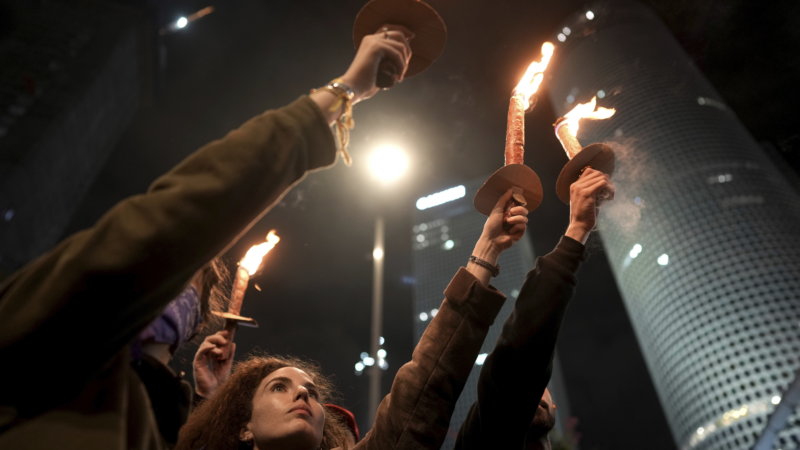Deadline passes without Gaza ceasefire going into effect
DEIR AL-BALAH, Gaza Strip — The deadline for the start of a ceasefire in the Gaza Strip passed as Israeli Prime Minister Benjamin Netanyahu said Hamas had not lived up to its commitment to provide the names of the three hostages it was set to release later on Sunday in exchange for scores of Palestinian prisoners.
The list had not been handed over when the deadline for the truce to begin passed at 8:30 a.m. local time, Rear Adm. Daniel Hagari, the top Israeli military spokesman, said. He said the army “continues to attack, even now, inside the Gaza arena,” and would until Hamas complies with the agreement.
Hamas blamed the delay in handing over the names on “technical field reasons.” It said in a statement that it is committed to the ceasefire deal announced last week.
An Israeli official said mediators have provided assurances that the list will be delivered and the deal is still expected to go forward, though the timing remains in question. The official spoke on condition of anonymity because of the ongoing efforts to resolve the matter.
Meanwhile, Israel announced that it had recovered the body of Oron Shaul, a soldier who was killed in the 2014 Israel-Hamas war, in a special operation. The bodies of Shaul and another soldier, Hadar Goldin, remained in Gaza after the 2014 war and had not been returned despite a public campaign by their families.
Delay underscores fragility of the agreement
The planned ceasefire, agreed after a year of intensive mediation by the United States, Qatar and Egypt, is the first step in a long and fragile process aimed at winding down the 15-month war.
Netanyahu said he had instructed the military that the ceasefire “will not begin until Israel has in its possession the list of hostages to be freed, which Hamas committed to provide.” He had issued a similar warning the night before.
The 42-day first phase of the ceasefire should see a total of 33 hostages returned from Gaza and hundreds of Palestinian prisoners and detainees released. Israeli forces should pull back into a buffer zone inside Gaza, and many displaced Palestinians should be able to return home. The devastated territory should also see a surge in humanitarian aid.
This is just the second ceasefire in the war, longer and more consequential than the weeklong pause over a year ago, with the potential to end the fighting for good.
Negotiations on the far more difficult second phase of this ceasefire should begin in just over two weeks. Major questions remain, including whether the war will resume after the six-week first phase and how the rest of the nearly 100 hostages in Gaza will be freed.
Palestinians celebrate despite delay
Dozens of people took to the streets in Gaza’s southern city of Khan Younis to celebrate the ceasefire, according to an Associated Press reporter.
Four masked and armed Hamas fighters arrived in two vehicles as the celebrations were underway, with people welcoming them and chanting slogans in support of the militant group.
The Hamas-run police began deploying in public after mostly lying low for months due to Israeli airstrikes. Gaza City residents said they had seen them operating in parts of the city, and the AP reporter in Khan Younis saw a small number out on the streets.
Palestinian residents began returning to their homes in parts of Gaza City early Sunday, even as tank shelling continued to the east, closer to the Israeli border, overnight. Families could be seen making their way back on foot, with their belongings loaded on donkey carts, residents said.
“The sound of shelling and explosions didn’t stop,” said Ahmed Matter, a Gaza City resident. He said he saw many families leaving their shelters and returning to their homes. “People are impatient. They want this madness to end,” he said.
Israel’s Cabinet approved the ceasefire early Saturday in a rare session during the Jewish Sabbath, more than two days after mediators announced the deal. The warring sides were under pressure from both the outgoing Biden administration and President-elect Donald Trump to achieve a deal before the U.S. presidential inauguration on Monday.
The toll of the war has been immense, and new details on its scope will now emerge.
Over 46,000 Palestinians have been killed, according to Gaza’s Health Ministry. The Oct. 7, 2023, Hamas-led attack on southern Israel that sparked the war killed over 1,200. Hundreds of Israeli soldiers have died.
Some 90% of Gaza’s population has been displaced. The United Nations says the health system, road network and other vital infrastructure have been badly damaged. Rebuilding – if the ceasefire reaches its final phase – will take several years at least. Major questions about Gaza’s future, political and otherwise, remain unresolved.
At the 2025 Grammys, Beyoncé takes home album of the year and Kendrick Lamar wins big
The unpredictable 67th Grammy Awards were filled with surprising wins for artists including Beyoncé — with her first album of the year win — as well as multiple wins for Kendrick Lamar and awards for rising stars like Chappell Roan and Doechii.
55 of the 67 victims have been recovered from the D.C. plane crash
Rescue and salvage crews are continuing to dig out bodies and debris in the Potomac River, after the deadliest air crash in two decades.
Rubio warns of U.S. action if Panama does not curb Chinese influence around the canal
Secretary of State Marco Rubio threatened unspecified action if Panama does not take steps to lessen Chinese influence over the Panama Canal.
Photos: See all the red carpet looks from the 67th Grammy Awards
Celebrating its 67th year, the 2025 Grammy Awards are here! See some of tonight's most memorable looks.
Trump used fentanyl to justify tariffs, but the crisis was already easing
The White House says fentanyl smuggled to the U.S. justifies tariffs against Canada, China and Mexico. But fentanyl deaths and smuggling have been dropping fast — and Canada plays almost no role.
A plane and a tug vehicle collide at Chicago’s O’Hare airport, injuring the driver
The 64-year-old tug driver sustained head and lower body injuries and was transported to the hospital in critical condition but was later stabilized, Chicago police said.




